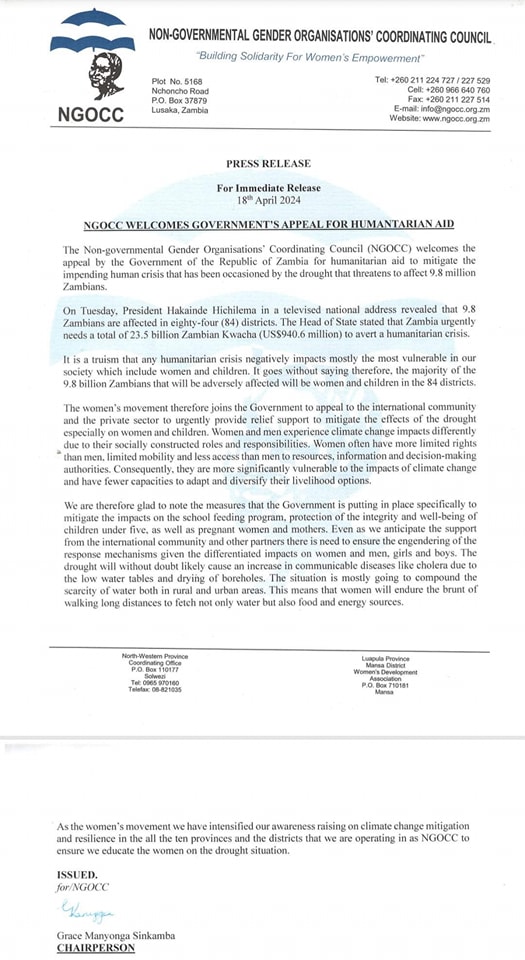NGOCC WELCOMES GOVERNMENT’S APPEAL FOR HUMANTARIAN AID
The Non-governmental Gender Organisations’ Coordinating Council (NGOCC) welcomes the appeal by the Government of the Republic of Zambia for humanitarian aid to mitigate the impending human crisis that has been occasioned by the drought that threatens to affect 9.8 million Zambians.
On Tuesday, President Hakainde Hichilema in a televised national address revealed that 9.8 Zambians are affected in eighty-four (84) districts. The Head of State stated that Zambia urgently needs a total of 23.5 billion Zambian Kwacha (US$940.6 million) to avert a humanitarian crisis.
It is a truism that any humanitarian crisis negatively impacts mostly the most vulnerable in our society which include women and children. It goes without saying therefore, the majority of the 9.8 billion Zambians that will be adversely affected will be women and children in the 84 districts.
The women’s movement therefore joins the Government to appeal to the international community and the private sector to urgently provide relief support to mitigate the effects of the drought especially on women and children. Women and men experience climate change impacts differently due to their socially constructed roles and responsibilities. Women often have more limited rights than men, limited mobility and less access than men to resources, information and decision-making authorities. Consequently, they are more significantly vulnerable to the impacts of climate change and have fewer capacities to adapt and diversify their livelihood options.
We are therefore glad to note the measures that the Government is putting in place specifically to mitigate the impacts on the school feeding program, protection of the integrity and well-being of children under five, as well as pregnant women and mothers. Even as we anticipate the support from the international community and other partners there is need to ensure the engendering of the response mechanisms given the differentiated impacts on women and men, girls and boys. The drought will without doubt likely cause an increase in communicable diseases like cholera due to the low water tables and drying of boreholes. The situation is mostly going to compound the scarcity of water both in rural and urban areas. This means that women will endure the brunt of walking long distances to fetch not only water but also food and energy sources.
As the women’s movement we have intensified our awareness raising on climate change mitigation and resilience in the all the ten provinces and the districts that we are operating in as NGOCC to ensure we educate the women on the drought situation.
ISSUED.
for/NGOCC
Grace Manyonga Sinkamba
CHAIRPERSON
